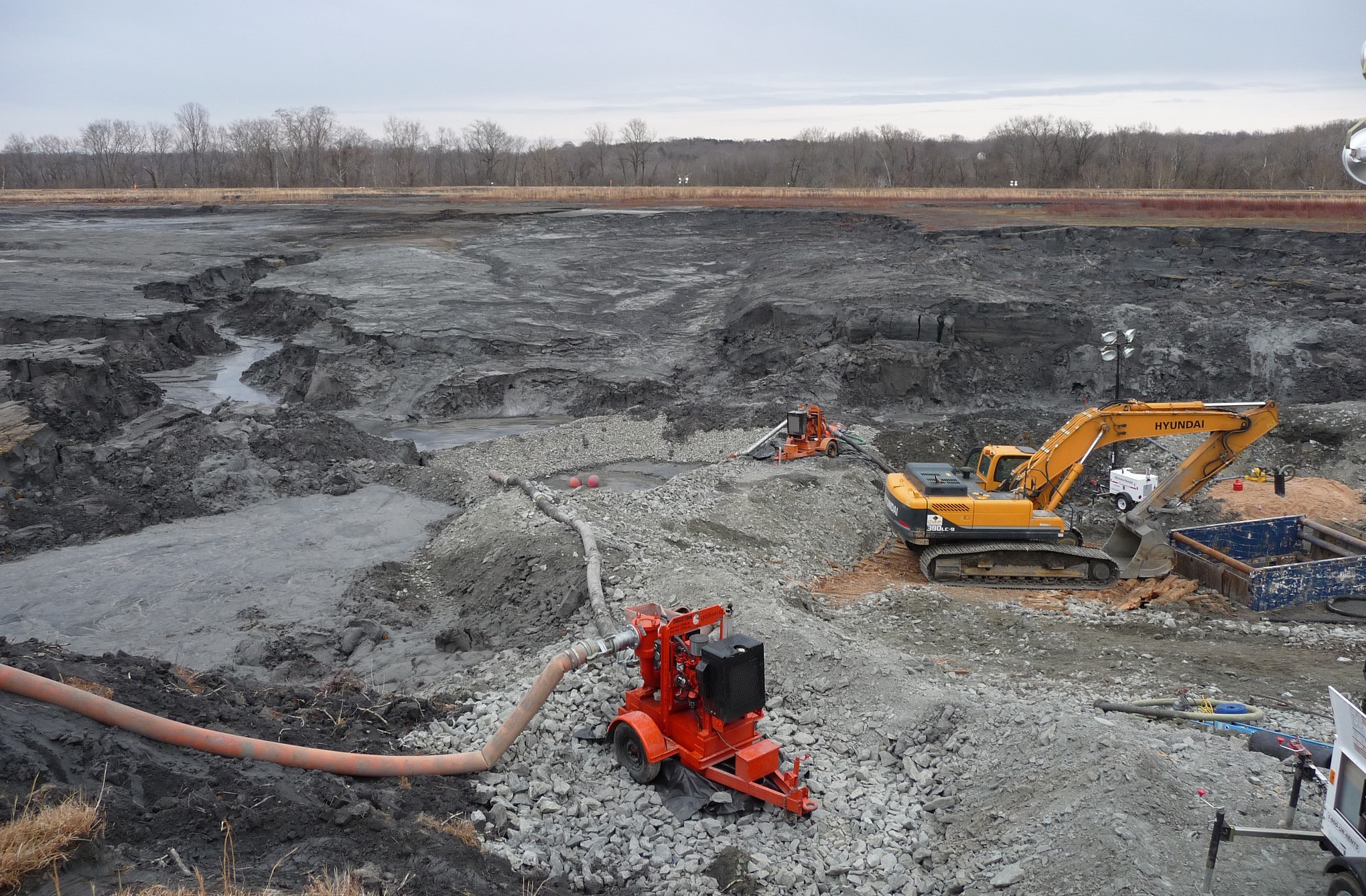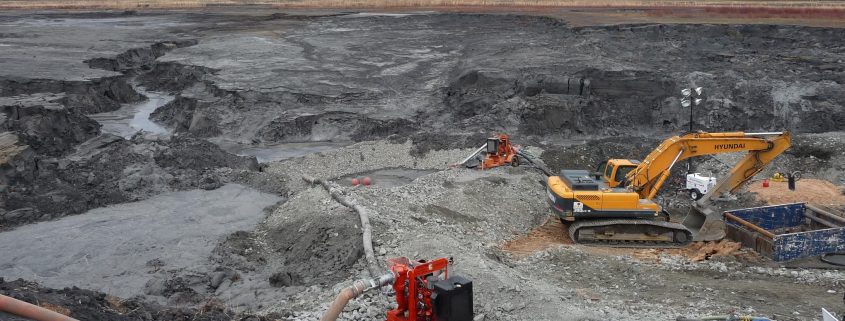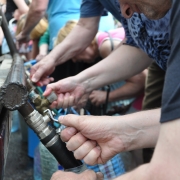Cleaner Coal Ash Disposal Gets Bipartisan Support in Virginia
Lawmakers address toxic legacy of coal waste ponds, which contaminate groundwater.

A pipe failure at a coal ash pond at a Duke Energy power plant in North Carolina spilled up to 39,000 tons of waste into the Dan River in 2014. Photo courtesy of U.S. Fish and Wildlife Service Southeast
By Whitney Pipkin, Bay Journal
This story is republished with the permission of the Bay Journal
Virginia’s toxic legacy of storing coal ash in unlined pits near Chesapeake Bay rivers could be put to rest by a bill that now has bipartisan support.
Under legislation backed Thursday by a bipartisan group of legislators, Gov. Ralph Northam, and Dominion Energy, the utility would have to fully excavate at least four coal ash impoundments around Virginia where the ash is currently stored. The ash would need to be recycled into concrete-making materials or safely landfilled within 15 years, according to the legislation.
Dominion maintains more than 11 coal ash ponds and six coal ash landfills totaling about 27 million cubic yards of ash. The plan would require the company to recycle a minimum of nearly 7 million cubic yards by the 15-year mark and to seal the rest in approved landfills.
Coal ash, the byproduct of burning coal for power, can contain toxic chemicals and heavy metals such as arsenic, lead and mercury, which have in some cases leached into the surrounding groundwater.
Environmental groups and residents vocally opposed Dominion’s previous plans to permanently store the ash by covering it in leak-prone, unlined pits, a move they said would harm local waterways and drinking water.
“We have fought for four years for legislation like this,” Potomac Riverkeeper Dean Naujoks said in a statement. “The dangers of coal ash leaking into groundwater, drinking wells, our rivers and streams and ultimately the Chesapeake Bay have long been documented.”
Naujoks credited the shift in the General Assembly to Northam, who proposed legislation in favor of ash recycling early this month, and Sen. Scott Surovell (D-Fairfax), who presented one of several senate bills that would require coal ash be excavated from pits near waterways. Sen. Amanda Chase (R-Chesterfield) also proposed bills that would prohibit coal ash impoundments in the Chesapeake Bay watershed like the one in her jurisdiction.
Surovell’s bill would require Dominion to use railways rather than trucks to transport the ash, when possible, and to recycle as much of the byproduct as possible. A coal ash subcommittee will combine the basic tenets of the bills into one to be considered by legislators this session.
“Fully adopted, this goes beyond the minimum required by the EPA,” Surovell said of the proposals that have bipartisan support. “We tend to be more hands-off when regulating economic activity with an environmental impact, so to adopt rules that are more protective than the EPA — I’m not sure if Virginia’s ever done that before.”
But, he said after meetings with Dominion and environmental groups that led to the compromise, it’s important for the utility to have flexibility in how it adopts the rules at each site to avoid rate hikes for consumers.
The proposed legislation allows the company to pass along the additional cost of the $3 billion plan to its customers. If it becomes law, Dominion customers could see an additional charge of up to $5 a month on their power bills beginning in 2021.
In an about-face from its original position, Dominion now supports the legislation requiring it to excavate coal ash from several sites. Spokesman Dan Genest said in a statement this week that the agreement “accomplishes clean closure, minimizes truck traffic and prudently manages customer costs for the closing of ash ponds at our power stations.”
Legislators in North Carolina — where a drainage pipe from a coal ash pit released 40,000 tons of the contaminant into the Dan River in 2014 — already are requiring their utilities to excavate and recycle coal ash from sites where it could leak into waterways.
Catastrophes like the one in North Carolina led the U.S. Environmental Protection Agency under the Obama administration to require in 2015 that utilities begin dismantling coal ash impoundments. The rules allowed utilities to close the pits where the ash was stored by draining them of the rainwater that had collected in the pits over decades and covering them with synthetic and natural layers.
In 2018, under the Trump administration, the EPA began rolling back several requirements for coal ash pits, such as raising the allowable level of some contaminants in groundwater.
After Virginia residents balked at the idea of permanently storing coal ash near waterways, the General Assembly imposed a moratorium on new permits that would allow the company to close the pits. Meanwhile, Dominion was required to produce a report, which showed more of the material would be valuable for recycling into bricks and concrete than originally thought.
Environmental groups who have advocated for an alternative to storing coal ash in unlined pits celebrated the proposal this week as a landmark step toward clean water.
“One of Virginia’s largest environmental threats will now be addressed in a comprehensive way that gets this toxic waste off our riverbanks once and for all and safeguards public health in the long term,” said Michael Town, executive director of the Virginia League of Conservation Voters.










Leave a Reply
Want to join the discussion?Feel free to contribute!